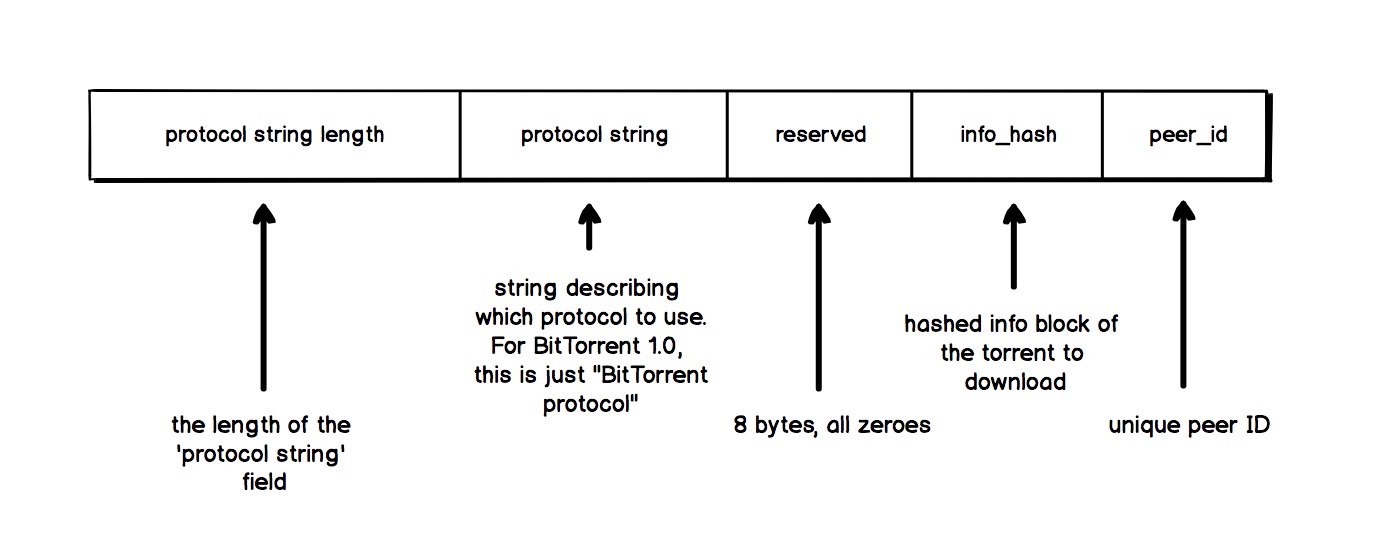BitTorrent clients for fun and profit
23 May 2018 | Reading time: 3 minThis is a work in progress.
…well, not really for profit. The world doesn’t need another BitTorrent client. But it’s a great project for learning about an interesting web protocol, exploring the networking stack, getting to grips with Wireshark and debugging, and learning how things work.
Reading a .torrent
The torrent files you might find somewhere like The Pirate Bay are encoded with bencode (pronounced “B-Encode”, but I’m still gonna say “ben-code”), a terse file format for representing a few simple data structures (strings, ints, dicts and lists).
A bencoded file might look like this:
dl10:hello dave!d3:foo3:bar4:fizz4:buzzei42eee
Tasty. Let’s add newlines for effect:
d
4:info
l
10:hello dave!
d
3:foo3:bar
4:fizz4:buzz
e
i42e
e
e
Elements in a bencoded structure have a letter denoting what they are: d for dicts, l for lists, i for ints. All of those are terminated with a trailing e. Strings are a little different: they start with the length of the string, then a colon, followed by the string itself (e.g. 3:foo).
In the above example, the root of the structure is a dict with one key (“info”) whose value is a list containing a string, a dict and an int.
Writing a decoder for this is an interesting exercise in itself; in the end, I used jackpal/bencode-go.
Here’s what a JSON output of this file might look like (I’m using a Ubuntu image torrent):
{
"announce": "http://torrent.ubuntu.com:6969/announce",
"announce-list": [
[
"http://torrent.ubuntu.com:6969/announce"
],
[
"http://ipv6.torrent.ubuntu.com:6969/announce"
]
],
"comment": "Ubuntu CD releases.ubuntu.com",
"creation date": 1524776308,
"info": {
"length": 1921843200,
"name": "ubuntu-18.04-desktop-amd64.iso",
"piece length": 524288,
"pieces": "\ufffd <truncated> \ufffd"
}
}
Talk to the tracker
Next, we need to make a request to the tracker to find some peers to connect to. The tracker URL is in the “announce” field of the metadata.
When first trying this, I got an HTTP 400 and the following error:
you sent me garbage - id not of length 20
Damn. This tracker is so SALTY.
Making a correct request to the tracker requires URL-encoding a bunch of params, including a SHA1 hash of the bencoded “info” section of the torrent metadata. The flow looks something like:
- de-bencode torrent metadata
- extract the “announce” address
- re-bencode the “info” block
- generate a random 20-byte peer ID:
func newClientID() []byte { clientID := make([]byte, 20) rand.Read(clientID) return clientID } - make a GET request to the announce URL with a bunch of query params:
"info_hash": <bencoded, hashed "info" block> "peer_id": <unique peer ID> "port": <port you're listening for connection on> "uploaded": <number of bytes uploaded> "left": <number of bytes left to download> "compact": <1 if using compact mode> "event": <one of 'started', 'completed', or 'stopped'> - de-bencode the response from the tracker, which contains a list of peers in the torrent swarm.
Handshaking with peers
Next, we have to handshake with some subset of the peers the tracker has told us about.
We open a TCP connection to the peer, and send the following message:

To be continued…